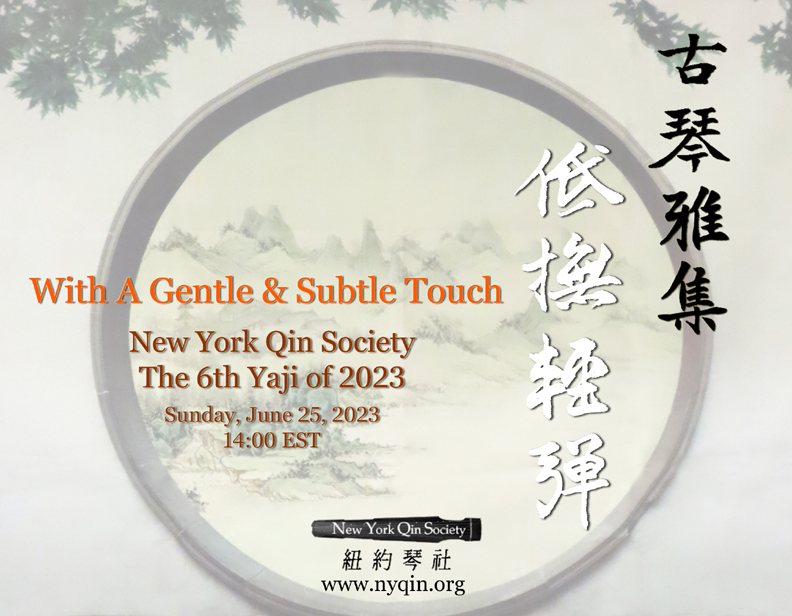With A Gentle and Subtle Touch 低撫輕彈 古琴雅集

Program
- João Oliveira – Qin performance of Xiao Xiang Shui Yun 瀟湘水雲, Misty River Xiao and Xiang
- Gust, Qin Streller-Shen 沈沁 – ‘The Robe of Luo Lan – Consciousness,’ a composition by the late qin master Chen Gong-liang. 成公亮先生作曲《袍修羅蘭-識》
- André Ribeiro 林柏儒 – present on ‘With a Gentle and Subtle Touch: Translating Master Yuan Jung-Ping Qin’s Writings into the Portuguese Language’ 關於以葡萄牙語解讀”低撫輕彈, 真落花流水溶溶也” 袁中平紀念吳兆基文.
- Peiyou Chang 張培幼 – Exploring Tang Dynasty Chen Zhuo’s Qin Shuo 陳拙[琴說] (On The Qin by Military Officer Chen Zhuo). (https://www.peiyouqin.com/qinshuo.html)

We had a wonderfully vibrant yaji. We are delighted to have had our first meeting with Miss Shen Qin, ( https://www.qinqin.ch/about-me.html) the founder of the Swiss Guqin Association, and thoroughly enjoyed her beautiful qin performance. It was also a pleasure to learn about her father’s publication of 沈洽 [音腔論] through Prof. Mingmei Yip.
The meeting was ended at 4:50pm EST
This was a private yaji. The meeting video recording is for internal use only.
For non-members who would like to attend our future virtual yaji, please contact info@nyqin.org.
Thank you.
Attendance
Andre Ribeiro, Andrea Lioy, Mingmei Yip, Ralph Knag, Peiyou Chang, Mandy Zostek, Dan Reid, Lawrence Kaster, Marilyn Wong Gleysteen, Hugo Andres Forero Patino, Alan Yip, Matthew Flannery, João Oliveira, Joseph Lam, Streller-shen Qin 沈沁, Sandra Yijia Cai, Han Qing, Laura Zi, Juliana Brachin, Yi Hu, 言恆
Feedback
Thank you very much for yesterday’s most interesting yaji. The patient uncovering of sedimented meanings in the characters chosen by the authors was illuminating. I also really enjoyed the focus on the Daoist philosophy of becoming one with the unfolding of the task, be it the playing of the qin as identified in both texts, or be it the process of translation itself. As a lover of languages, I aspire to one day attain effortless mastery in following the Dao of translation [à la 庖丁 in 莊子] in the hope that I too could avoid the hazards of poor interpretation, or worse: the pitfalls of the “traduttore-traditore” [Italian: translator/traitor]! it was so funny and unexpected to hear it!  The performances and explanations were terrific and enjoyable as well. Thank you for organizing this wonderful text-based event and for allowing me to participate.With kind regards to all,
The performances and explanations were terrific and enjoyable as well. Thank you for organizing this wonderful text-based event and for allowing me to participate.With kind regards to all,
Laura
Dear Qin Friends,
Thank all participants for yesterday’s meeting. As tedious as the translation work may seem at times, it remains an essential task in disseminating critical knowledge about the musical practice we adopt in our lives. It is actually one of the keystones of the study of Qin [Qínrén 琴人, Qínqì 琴器, Qín de jīngdian 琴的經典]
A Yaji (like yesterday’s) dedicated to translating fundamental texts is vital to help understand the history and evolution of Qin. This is especially important for its transmission in Western practice contexts, considering the growing number of Western students involved in this art far from knowing the Chinese language. As Professor Qin Streller-Shen told us, most of their students are Westerners. They would benefit significantly from transmitting texts in Western languages, namely English, Portuguese, French, Spanish, German, Italian, etc.
Thank you all very much for your warm receptivity.
André Ribeiro
